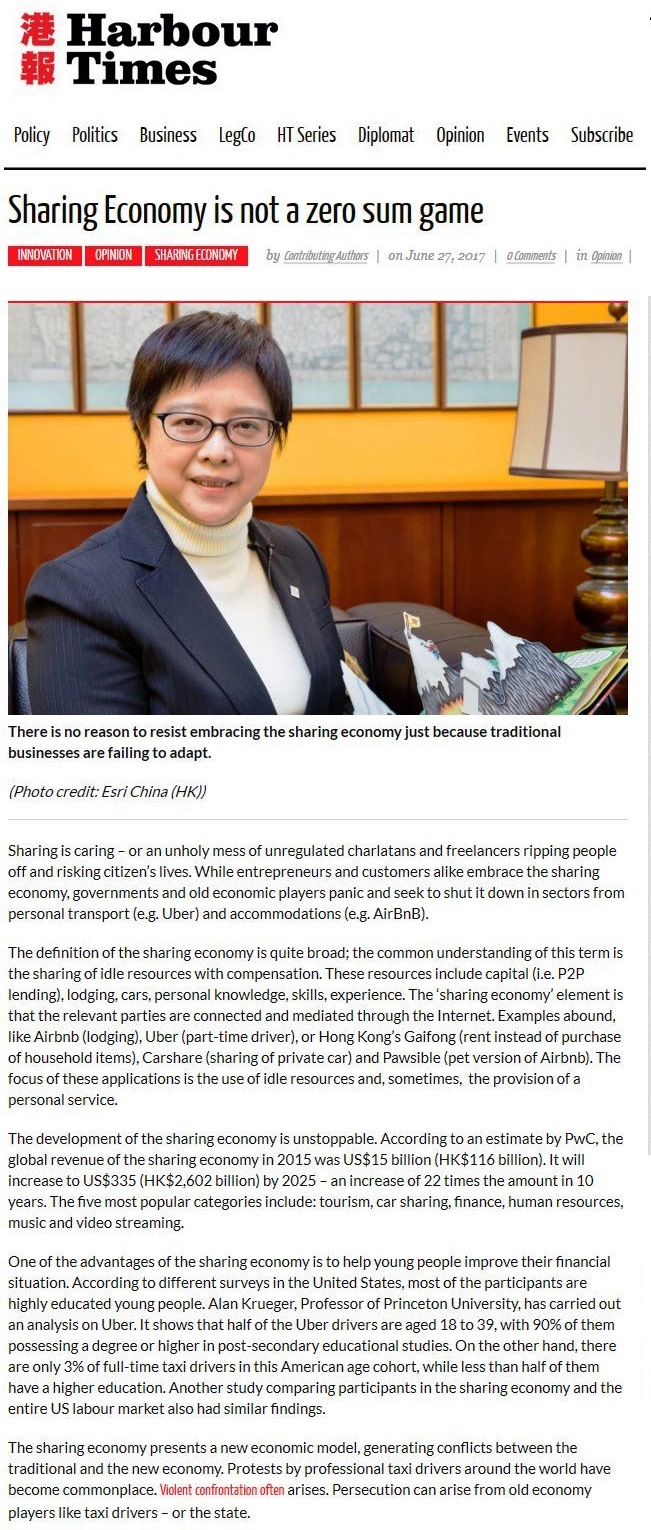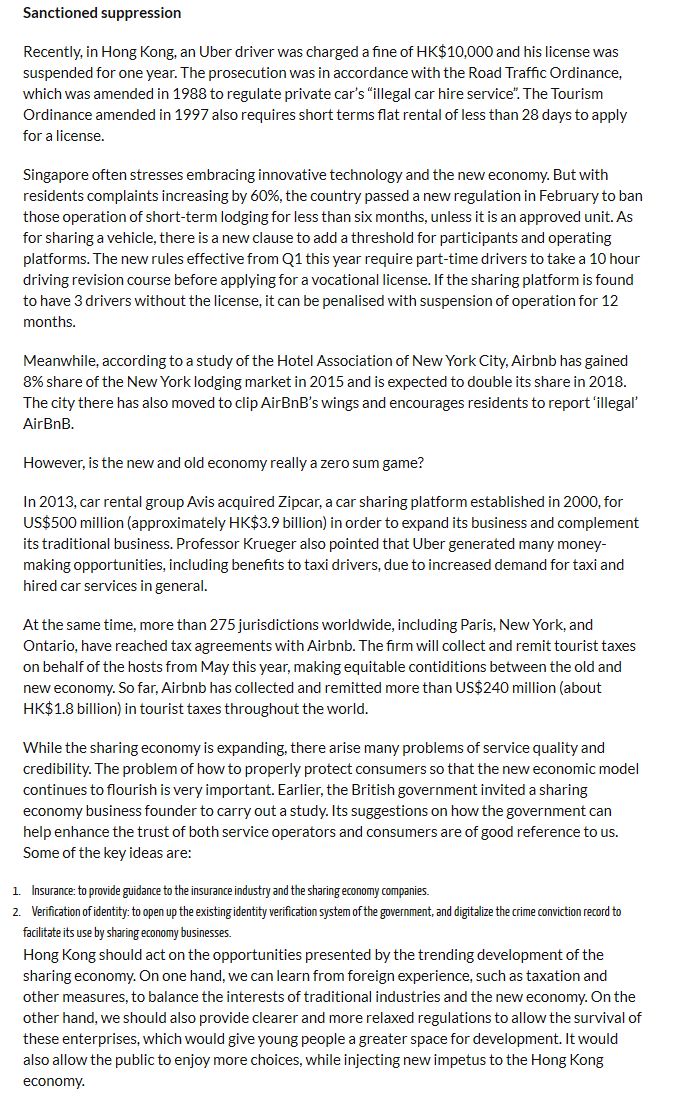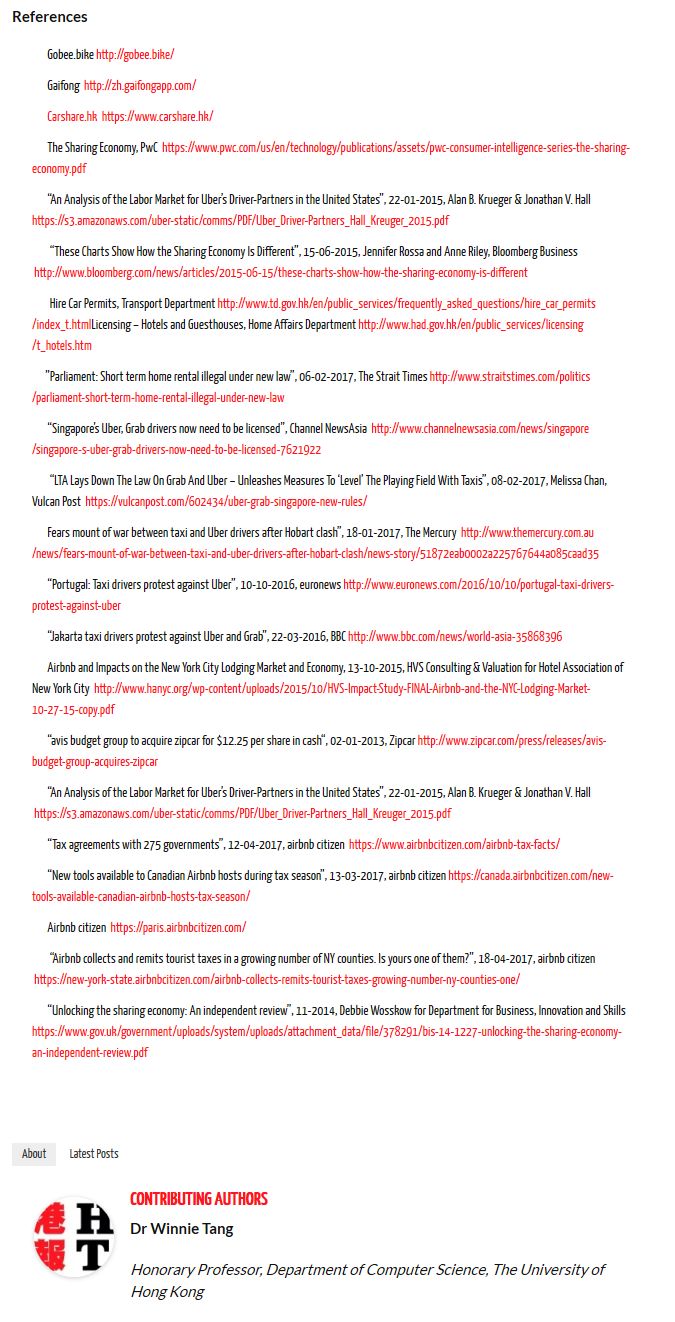網上版請按此



Sharing Economy is not a zero sum game
Sharing is caring – or an unholy mess of unregulated charlatans and freelancers ripping people off and risking citizen's lives. While entrepreneurs and customers alike embrace the sharing economy, governments and old economic players panic and seek to shut it down in sectors from personal transport (e.g. Uber) and accommodations (e.g. AirBnB).
The definition of the sharing economy is quite broad; the common understanding of this term is the sharing of idle resources with compensation. These resources include capital (i.e. P2P lending), lodging, cars, personal knowledge, skills, experience. The 'sharing economy' element is that the relevant parties are connected and mediated through the Internet. Examples abound, like Airbnb (lodging), Uber (part-time driver), or Hong Kong's Gaifong (rent instead of purchase of household items), Carshare (sharing of private car) and Pawsible (pet version of Airbnb). The focus of these applications is the use of idle resources and, sometimes, the provision of a personal service.
The development of the sharing economy is unstoppable. According to an estimate by PwC, the global revenue of the sharing economy in 2015 was US$15 billion (HK$116 billion). It will increase to US$335 (HK$2,602 billion) by 2025 – an increase of 22 times the amount in 10 years. The five most popular categories include: tourism, car sharing, finance, human resources, music and video streaming.
One of the advantages of the sharing economy is to help young people improve their financial situation. According to different surveys in the United States, most of the participants are highly educated young people. Alan Krueger, Professor of Princeton University, has carried out an analysis on Uber. It shows that half of the Uber drivers are aged 18 to 39, with 90% of them possessing a degree or higher in post-secondary educational studies. On the other hand, there are only 3% of full-time taxi drivers in this American age cohort, while less than half of them have a higher education. Another study comparing participants in the sharing economy and the entire US labour market also had similar findings.
The sharing economy presents a new economic model, generating conflicts between the traditional and the new economy. Protests by professional taxi drivers around the world have become commonplace. Violent confrontation often arises. Persecution can arise from old economy players like taxi drivers – or the state.
Sanctioned suppression
Recently, in Hong Kong, an Uber driver was charged a fine of HK$10,000 and his license was suspended for one year. The prosecution was in accordance with the Road Traffic Ordinance, which was amended in 1988 to regulate private car's "illegal car hire service". The Tourism Ordinance amended in 1997 also requires short terms flat rental of less than 28 days to apply for a license.
Singapore often stresses embracing innovative technology and the new economy. But with residents complaints increasing by 60%, the country passed a new regulation in February to ban those operation of short-term lodging for less than six months, unless it is an approved unit. As for sharing a vehicle, there is a new clause to add a threshold for participants and operating platforms. The new rules effective from Q1 this year require part-time drivers to take a 10 hour driving revision course before applying for a vocational license. If the sharing platform is found to have 3 drivers without the license, it can be penalised with suspension of operation for 12 months.
Meanwhile, according to a study of the Hotel Association of New York City, Airbnb has gained 8% share of the New York lodging market in 2015 and is expected to double its share in 2018. The city there has also moved to clip AirBnB's wings and encourages residents to report 'illegal' AirBnB.
However, is the new and old economy really a zero sum game?
In 2013, car rental group Avis acquired Zipcar, a car sharing platform established in 2000, for US$500 million (approximately HK$3.9 billion) in order to expand its business and complement its traditional business. Professor Krueger also pointed that Uber generated many money-making opportunities, including benefits to taxi drivers, due to increased demand for taxi and hired car services in general.
At the same time, more than 275 jurisdictions worldwide, including Paris, New York, and Ontario, have reached tax agreements with Airbnb. The firm will collect and remit tourist taxes on behalf of the hosts from May this year, making equitable contiditions between the old and new economy. So far, Airbnb has collected and remitted more than US$240 million (about HK$1.8 billion) in tourist taxes throughout the world.
While the sharing economy is expanding, there arise many problems of service quality and credibility. The problem of how to properly protect consumers so that the new economic model continues to flourish is very important. Earlier, the British government invited a sharing economy business founder to carry out a study. Its suggestions on how the government can help enhance the trust of both service operators and consumers are of good reference to us. Some of the key ideas are:
1 Insurance: to provide guidance to the insurance industry and the sharing economy companies.
2 Verification of identity: to open up the existing identity verification system of the government, and digitalize the crime conviction record to facilitate its use by sharing economy businesses.
Hong Kong should act on the opportunities presented by the trending development of the sharing economy. On one hand, we can learn from foreign experience, such as taxation and other measures, to balance the interests of traditional industries and the new economy. On the other hand, we should also provide clearer and more relaxed regulations to allow the survival of these enterprises, which would give young people a greater space for development. It would also allow the public to enjoy more choices, while injecting new impetus to the Hong Kong economy.
Dr. Winnie Tang
Honorary Professor, Department of Computer Science, The University of Hong Kong